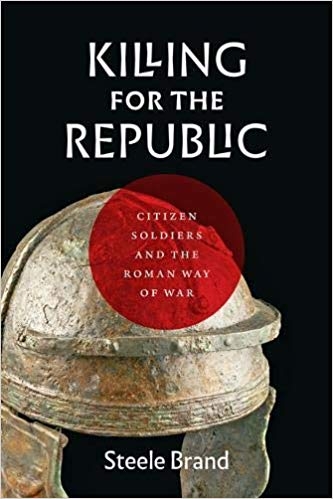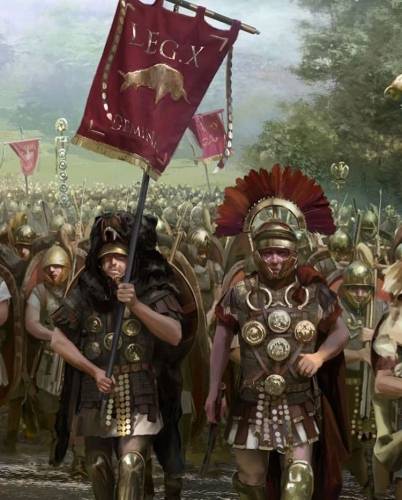jeudi, 16 janvier 2020
In Praise of Rome’s Citizen Soldiers
They fought for home and family, which was preferable to professional mercenaries only in it for the emperor's spoils.
Steele Brand is a historian who pays not even lip service to historical determinism. The Roman Republic collapsed, Brand says, because of deliberate choices made by “grasping, ambitious and amoral” leaders who took advantage of a debased “culture” that became more “perfectly suited to autocracy” than to freedom. Brand’s book should be read with care by Americans as our republic enters its twilight, as the ambitions of our political class replace the traditions of our ancestors.
Readers of many tastes will receive great enjoyment from Brand’s book. For those interested in general history, Brand provides a readable, engaging political history of the Roman Republic from the Roman kings to the rise of Augustus. He overlays a fascinating account of the development of Roman military strategy, tactics, weaponry, and chain of command, as well as providing detailed accounts of some of the most important battles of the Roman Republic, such as Sentinum, New Carthage, Pynda, Mutina, and Philippi. He also opens a window into the public spiritedness, or “civic virtue,” of the typical soldier of the Republic, who loved Rome, not out of greed or ambition, but because it protected his “little platoon,” his family and his farm. Fighting for the things these soldiers loved concretely made them particularly lethal.
 The book, moreover, is stocked with well-selected quotes from great writers and historians of the time, such as Livy, Plutarch, Polybius, and Cicero, who were contemporaries of, or even participants in, the greatest events of the Republic. I have read all these authors, though I must admit that Brand gave me new appreciation for their writings by placing them firmly in their historical context.
The book, moreover, is stocked with well-selected quotes from great writers and historians of the time, such as Livy, Plutarch, Polybius, and Cicero, who were contemporaries of, or even participants in, the greatest events of the Republic. I have read all these authors, though I must admit that Brand gave me new appreciation for their writings by placing them firmly in their historical context.
What’s really not to be missed in the book are the last 100 pages, which provide a riveting account of the vicious political jockeying and outright civil wars that came in the wake of the assassination of Julius Caesar. While the historical events of the 1st century B.C. are not analogous to America’s current political turmoil, i.e. Donald Trump is not Julius Caesar, there are recognizable character flaws common to both the men who were willing to overthrow the Roman constitutional order and our current hubristic political class.
The Roman and American situations run parallel in that republics fall apart when the ambitions of amoral actors create such partisan rancor that they create competing claims of “legitimacy.” When political opponents become existential outlaws or are seen as wholly illegitimate, the nation slouches toward civil war. Here in America, magnanimity in politics is replaced by viciousness. And in the 1st century B.C., questions of political legitimacy put the Roman army into play: “At a time when Roman soldiers were being given conflicting information about who was legitimate, any commander became fair game for desertion, betrayal, or assassination if he behaved incompetently or failed to look out for their interests.”
Refreshingly, Brand is a partisan for the Roman Republic. He believes that a mixed regime, with both popular and aristocratic elements, is far preferable to vesting all political power in an emperor. And he believes that a citizen-soldier army that fights for its farms and families is preferable to a professional, mercenary army that fights for the booty dispensed by that emperor. Julius Caesar, he says, “deserves his place in history alongside other great generals like Cyrus, Alexander, Attila, Genghis Khan, Cortés, and Napoleon, but like them, he was nothing short of a monster.”
Brand ominously points out that most of the Framers of the U.S. Constitution, as well as Thomas Jefferson, were fans of the great Roman republican figures, such as Brutus and Cicero, while Americans today are more likely to be fans of Caesar, who is “admired as an exemplar of courage, decisiveness, skill, genius, and good fortune.” It is somewhat disconcerting that the American imagination now prefers the one to the other.
Finally, while Brand acknowledges that the Roman Republic sometimes pushed other people around, its constant warfare seems not to have been a general symptom of imperialism but a historical necessity. “During the time frame in which Rome rose to power,” he writes, “international state systems were declining or totally absent, and anarchy and lawlessness were at their peak. Law, justice, order and peace were impossible to maintain in a Hobbesian world where every state was as militaristic as the next.”
Unlike post-Cold War America, where a foreign invasion is unthinkable, the Roman Republic had been viciously sacked by the Gauls and nearly destroyed by Hannibal in the Second Punic War. For most of the Republic’s existence, “forever war” was a necessity, not a choice; in the contemporary American case, forever war is not a necessity, but a choice.
That said, when the virtue of many of the leading figures in Rome became debauched, the presence of a large military was undoubtedly a factor in the demise of the Republic. When the Republic displayed a crisis of legitimacy, the army turned on itself and “these citizen-soldiers were no longer killing for the Republic. They were killing it.”
There is a parallel danger in contemporary America. We now have a gigantic military-intelligence-industrial complex that seems to question the legitimacy of a duly-elected president and is willing to scheme unconstitutionally for his demise. A large-scale politicization of our huge national security establishment would be an ominous development indeed. When the ethos of that national security community has degenerated from the nonpartisan statesmanship of a George Marshall to the scheming partisanship of a John Brennan, it is apparent that the recovery of genuine statesmanship is the only thing that can save us from the Roman Republic’s fate.
William S. Smith is research fellow and managing director at the Center for the Study of Statesmanship at The Catholic University of America. His latest book is Democracy and Imperialism, published by the University of Michigan Press.
00:37 Publié dans Histoire, Militaria | Lien permanent | Commentaires (0) | Tags : histoire, rome, rome antique, antiquité romaine, légion romaine, humanités gréco-latines |  |
|  del.icio.us |
del.icio.us |  |
|  Digg |
Digg | ![]() Facebook
Facebook




Les commentaires sont fermés.